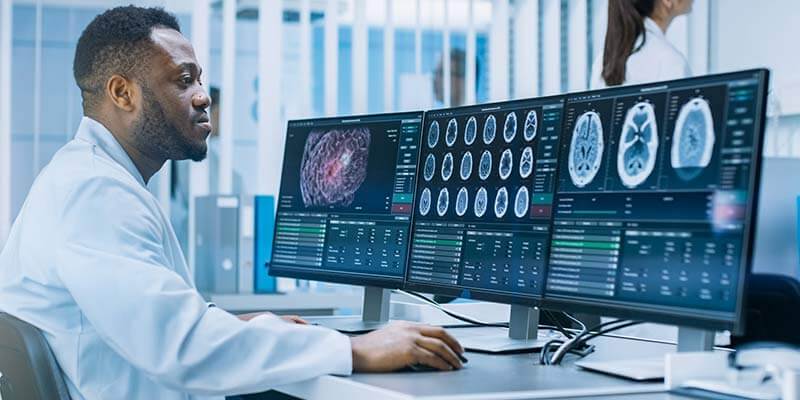Life after high school can feel overwhelming, especially when the choices you make may shape your career for decades to come. If you know you want to work in healthcare but aren’t drawn to the long, demanding path of medical school, becoming an MRI technologist could be the perfect alternative. The first step? Enrolling in an accredited MRI tech school.
But here’s where another big decision comes in: should you choose a traditional, in-person school or an online program? Both paths can lead to certification and a career in MRI, but each has pros and cons. Understanding those differences—and considering your lifestyle, learning style, and long-term goals—will help you make the right choice.
Why MRI Is Worth Pursuing
Before diving into the school comparison, it helps to understand why MRI technology has become such a popular career path. According to the U.S. Bureau of Labor Statistics (BLS), MRI technologists earn a median salary of about $88,180 per year as of 2024. By comparison, radiologic technologists overall earn about $78,980 annually, meaning MRI technologists are among the higher-paid professionals in diagnostic imaging.
The job outlook is also promising. The BLS projects 5% job growth between 2024 and 2034, faster than the national average for most occupations. That translates into roughly 16,000 job openings per year, driven by expanding healthcare services, new hospital construction, and the growing reliance on advanced imaging.
Put simply, demand is strong, salaries are competitive, and the profession offers long-term stability. With benefits like these, it’s no wonder so many students are exploring their options for MRI education.
The Traditional MRI Tech School Experience
Traditional MRI tech schools operate much like other college or university programs. You attend classes in person, follow a structured semester schedule, and complete assignments and projects on deadlines set by the instructor. Many students thrive in this format because it provides clear structure, face-to-face interaction with faculty, and opportunities for group study and collaboration.
Traditional schools may be a good fit if:
-
You prefer a highly structured environment.
-
You’re motivated by in-person classes and peer interaction.
-
You want easy access to campus resources like labs and libraries.
But there are drawbacks. Traditional schools can be inflexible, requiring you to attend classes at specific times and commute to campus. For students juggling jobs or family responsibilities, this lack of flexibility can make it difficult to balance education with real life. And because in-person programs often come with higher tuition and additional commuting or housing costs, the financial burden may be greater as well.
The Online MRI Tech School Advantage
Online MRI tech schools have surged in popularity over the last decade, especially after the pandemic accelerated the adoption of virtual learning. For students who need flexibility, online programs are often the smarter choice.
With an online program, you can:
-
Study at your own pace, fitting lessons around your schedule.
-
Retain your day job while pursuing education.
-
Avoid commuting and related expenses.
-
Learn in the comfort of your own home with 24/7 access to resources.
Online learning doesn’t mean sacrificing quality. Accredited online MRI programs cover the same core curriculum as traditional schools—anatomy, physiology, MRI physics, patient care, and safety protocols. Many also integrate interactive modules and simulations to help students grasp complex concepts.
Perhaps the biggest advantage is flexibility. You can study early in the morning, late at night, or during weekends—whenever it suits you best. This makes it possible to move forward in your career without putting the rest of your life on hold.
Clinical Training: The Common Ground
Whether you choose traditional or online education, one thing remains constant: clinical training. To sit for the ARRT certification exam, students must complete hands-on clinical experience, including documented cases performed under supervision.
At Pulse Radiology Institute, for example, students benefit from a network of more than 1,000 clinical partners across the U.S. Each student is paired with a licensed MRI technologist who mentors them throughout their training. This ensures that, even in an online program, students graduate with real-world experience and confidence in their skills.
Making the Choice That’s Right for You
So how do you decide between traditional and online education? Start by asking yourself these questions:
-
Do I prefer a classroom setting, or do I thrive with self-paced study?
-
Am I balancing work or family obligations that make flexibility essential?
-
Do I want to save on commuting and housing costs, or am I comfortable paying more for in-person interaction?
-
Am I disciplined enough to stay on track with online learning, or do I need the structure of a classroom?
Your answers will help clarify which path fits your lifestyle. For many students today, the flexibility and affordability of online programs outweigh the benefits of traditional schooling.
No matter which path you choose, the key is to select an accredited program that prepares you for certification and clinical practice. An MRI tech school should give you the knowledge, skills, and confidence to succeed in a growing healthcare field—and Pulse Radiology Institute delivers exactly that.
With ARRT-accredited online programs, nationwide clinical partnerships, and a flexible learning structure, PRI makes it possible to step into one of the most rewarding careers in healthcare. Whether you’re fresh out of high school or ready for a career change, our programs can help you achieve your goal of becoming a certified MRI technologist.





